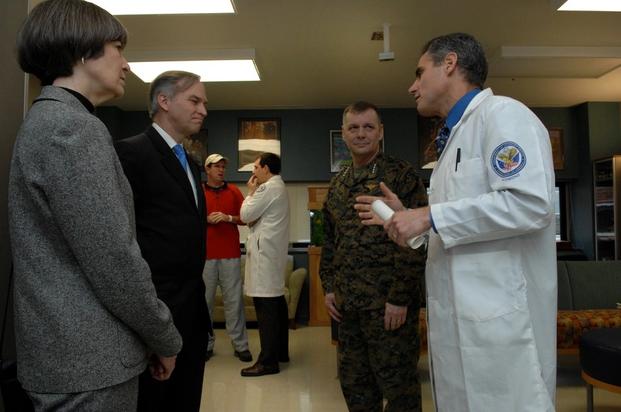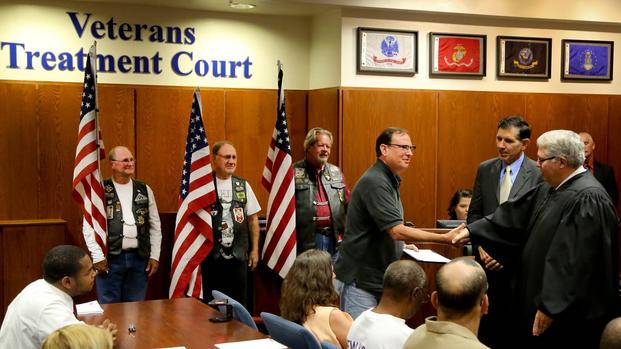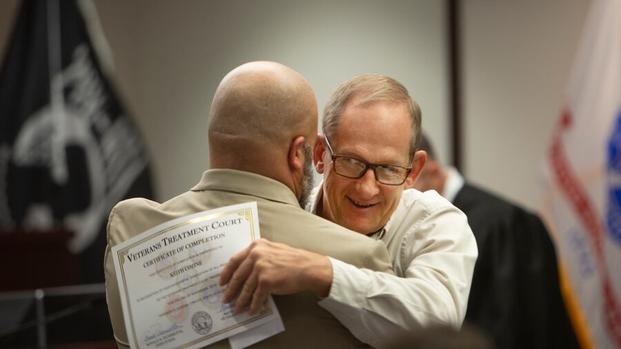Joshua Lowery stood in front of a packed courtroom and smiled. Unlike previous trips to the local courthouse, he had reason to celebrate.
Lowery had just graduated from the Veterans Treatment Court in Coeur d’Alene, Idaho.
“I’ve been sober for two years now,” Lowery said with a proud smile. “It’s probably the best thing I could’ve done for myself. I would’ve never admitted that to myself before.”
Two of the people smiling back at Lowery were his wife and daughter. They were proud of him too.
After signing up for the Utah Army National Guard in 2002, Lowery completed 21 years in the military, retiring in 2023. He had served overseas on deployments.
Trouble with the Law
Similar to many veterans, civilian life proved to be a difficult transition. Lowery’s identity as a soldier was no longer there. He was grasping to find the sense of purpose he had known for two decades.
Then came legal troubles. In September 2023, the veteran was arrested and faced four misdemeanor charges of disturbing the peace.
Veterans Treatment Court proved to be Lowery’s saving grace. In the Coeur d’Alene area, the program began in 2024 to help veterans fighting substance use disorders, mental health issues, or other trauma-related problems.
Lowery completed his year in the program and, on Oct. 14, celebrated with two other graduates. At the graduation ceremony, Lowery described the feeling of losing his sense of direction.
“We stumbled,” Lowery told the Coeur d’Alene/Post Falls Press. “This court gave us the opportunity to regain that footing and realize our service didn’t have to be over.”
In Idaho, veterans’ treatment courts are growing, with 69 programs in 38 counties. Results have shown that treatment courts help reduce the number of participants getting arrested again, increase the rate of successful drug abuse treatment, bring families back together, and deliver reduced taxpayer costs to state and local authorities, based on results from the Idaho Supreme Court.

First District Judge Tristan Poorman oversees the Veterans Treatment Court in Coeur d’Alene.
“You can’t incarcerate society out of a problem,” Poorman said. “(Specialty courts) give people tools to help them with whatever issues they have in a community setting.”
The treatment court in Coeur d’Alene is slightly different than other similar programs in Kootenai County, Idaho as it’s designed to support veterans dealing with trauma. The program’s mental health providers are veterans, and each participant is paired with another veteran.
Program coordinator Buddy Winters said typically veterans find it easier to open up to other veterans, especially those who’ve experienced similar pain.
Winters, after completing a stint in the Navy, became a police officer. He remembers the difficulty of having to arrest Vietnam War veterans for battery, DUIs and drug charges.
“They were in their 60s and they were still dealing with the trauma of Vietnam,” Winters said.
Those experiences made Winters a firm believer in programs to help military members transition out of service.

Veterans Bond with Other Veterans
Once they’re enrolled in the program, veterans work alongside program staffers to create an outpatient treatment plan. Every plan is tailored to meet individual needs. The only rule is all participants have to attend scheduled court proceedings, meet with counselors and adhere to regular testing for substance use.
Proceedings aren’t like any other typical court hearing.
“It’s not to condemn the veterans for what they did,” Lowery said. “It’s to bring them back to a state of grace and return them to honor through accountability.”
The court allows veterans to be honest with themselves, showcasing successes, while also recognizing aspects of life they’re struggling with. Honesty and vulnerability make veterans accountable for their actions, while also helping the program find the support they need.
Partnering with another veteran also helps participants, Poorman said, especially in the initial stages of the program “when they feel like they don’t have anyone.”
The sessions also build camaraderie; an important aspect veterans miss after they leave the service.
“You hear that theme over and over again,” Winters said. “‘I’m not alone. I have a community of support. I have fellow veterans who understand what I’m going through.’”
For Lowery, treatment court also made him reconnect with the importance of serving others. He took up volunteering for the Harrison Community Ambulance Association driving ambulances and eventually becoming a registered EMT.
It’s given the veteran an opportunity to know the people he serves, granting him that sense of purpose and belonging he yearned for.
“We need the people we serve just as much as they need us,” he said. “I had to come to realize that.”
The treatment court has also improved his self-awareness and made him realize it takes a brave solider to show vulnerability in front of others.
“It’s OK to talk to people about issues you’re having in your life and to rely on other people,” he said. “To rely on them does not make you weak. It does not make you compromised. To learn to do so is actually a strength.”

From Participant to Mentor
The treatment court impacted Lowery’s life so much that he plans to keep working with the program as a mentor.
“It’s not about changing who you are,” Lowery said. “It’s about returning you to the person you were when you served your country. That’s why I think this court’s got a really bright future.”
After the military, many veterans lose their sense of belonging, sometimes choosing a wayward path. But Poorman said Veterans Treatment Court helps them find their way and to “really believe in themselves.”
For Poorman and treatment court organizers, it’s a chance for them to give back to veterans too.
“We can never fully repay or thank them for the years they have given this country,” Poorman said. “But we can try.”















